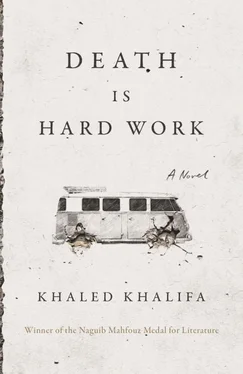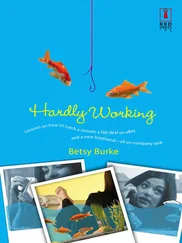Abdel Latif went inside and spent some time reading a book he found in the rubble; the book was torn, but there was still a possibility its binding could be repaired. When he left the church in the evening, Nevine was sitting on a large boulder outside, waiting for him. He was surprised to see her there. He sat beside her, and she repeated that she didn’t want to spend the rest of her life alone. The two of them went quiet and didn’t move. Then Abdel Latif took hold of her hand and kissed her timidly. He pulled her into an embrace, and they sank into a long kiss; Abdel Latif immediately considered it the only real kiss in his life. Still, they both acted quite properly. They stood up and went to the house of their friend Sheikh Abdel Sattar and asked him to marry them. Nevine invited the few remaining friends of her sons to witness the signing of the marriage contract.
Happily, a few people were still around to celebrate the wedding with them—the front lines were relatively quiet that night, so there was no need for every man to be at his post. The wedding was perfectly ordinary, and not in the least bit strange, as Nevine had feared—it was simply an occasion for joy. Fighters fired into the air to celebrate the newlyweds, and no one who remained in the town—sharing their hunger, thirst, and cold, caring for the graves of the martyrs—refused Ustadh Abdel Latif’s invitation. He felt a powerful sense of renewed connection to everything, and there were new, different feelings now, too, driving away the image of himself he’d been nursing all these years—an elderly man killing time as he waited to die. He took up once more all his old and powerful ideals about revolution and living an honorable life. Deep down he felt himself to be fortunate; he would witness the end of a regime that had brought him nothing but shame since his youth. His former party comrades had betrayed every principle and pounced upon every advantage, had imprisoned their old friends for years at a time, and hadn’t hesitated to sell out their cause to stay in power.
Life settled down after the siege closed around the town. Abdel Latif no longer had anything to do but pass the time. He planted flowers on graves and in the walkways of his graveyard, which he hadn’t expected to grow so huge. He organized everything, numbering the graves and recording every detail in a large register: the names of the victims, how they had died, their last words, their family names and ID numbers, and a full description, including height, eye color, skin tone, and any distinguishing marks. Perhaps no one would stay in town for much longer, he used to think, but the day would come when they would all return, and when they did, they should know where their loved ones were buried. He didn’t know why people would want to know this, as such, but considered running the graveyard a sacred duty just the same; the living looked after themselves well enough.
Despite starvation, everyone still clung to hope and spoke optimistically about the days to come. They realized that despair meant drowning in the abyss, so kept faith with the confidence that was the only possession they had left. The regime, with all its might behind it, inflicted unimaginable losses in every battle, but the people of S couldn’t retreat; they had burned all their bridges.
Nevine was surprised she was still capable of doing so much. She would talk animatedly about her previous life, and Abdel Latif would listen sympathetically. He lit candles for her every night, and they would reorder the place afresh. Outside they would move lightly among the ruins, exchanging kisses in the abandoned, shattered houses. They took shelter from a rain shower under a roof, embracing each other as though they might be separated at any moment. They had no time to search for the right term to define their new life together even though they both liked big words. They relished all the small details they had been missing in their lives. They went hungry with each other and with everyone else, and they gathered grasses and concocted soups out of narcissus bulbs and nameless herbs. They hoarded salt carefully, made bread from whatever remnants of lentils, chickpeas, or beans were available, or really out of anything that could make up for the flour that was usually missing. The usable roads linking S to a nearby town that wasn’t under siege were secret and few, and they brought in only a small quantity of medicine and flour. Abdel Latif and Nevine didn’t approve of the monopoly that the fighting men had on the majority of the smuggled goods, but they didn’t have time to find fault or to fight over a handful of flour. They worked vigorously to plant Abdel Latif’s garden with vegetables they could dry and store, such as beans, eggplants, tomatoes, and a few ears of corn; under siege, one didn’t have the luxury of choice.
Nevine couldn’t shake off her fear of winding up alone. Abdel Latif no longer gave her the time or space to talk freely about her past life; they had discussed the past enough to forget it. He was always keeping her occupied with daily plans, and she soon fell in with him and entered enthusiastically into their new life. She joined him in making butterfly nets and ran behind them like a small child, indifferent to the bombs and missiles exploding incessantly nearby. She was convinced that the best way of beating the war was to stop talking about it. She had stopped being afraid of dying a long time before and was even more reckless than Abdel Latif, who would rush off to the front lines swinging a first-aid kit at the least provocation. Nevine would walk calmly through the empty streets, looking at the bombs raining down over the town, and the only thought she gave them was this: They won’t kill anyone, unless it’s from fear. There was no one left for the bombs to blow up, after all. They’d already murdered everyone there was to murder; now they were destroying only already destroyed houses. The fighters could protect themselves well enough by digging long trenches and erecting secret fortifications, shoring up their already strong defense lines. In the end, though, war is war, and it wouldn’t be over easily or quickly. It carried its stench with it wherever it reached, wafting over everyone, leaving nothing as it had been. It altered souls, thoughts, dreams; it tested everyone’s capacity for endurance.
Nevine’s resolution not to spend her remaining years alone wasn’t trivial. She knew she would die, but not soon. It took many tries before she could tear off the vines of loneliness, which began by constricting her breathing and ended by giving her the crushing sensation that nothing else lay in store for her. She woke alone every morning, unconcerned with the preoccupations shared by the rest of mankind. Nevine no longer thought of being a grandmother; that dream was over, and now she was suspended in space. She wouldn’t reconsider her break with her husband’s family; her absurd battle with them for influence had wasted enough time already. She’d spent years embroiled in gratuitous conflicts whose triviality she felt only now. Everything she had built was destroyed—the family, the house—the only thing she could do now was wait to die, but death remained such a distant prospect, in her mind. Victory in the revolution meant nothing to her anymore, other than the chance of seeing her son’s murderers dragged through the streets. She was gripped by fantasies of revenge for losses for which there was no possible restitution. After losing their compassion, a person becomes little more than another corpse abandoned by the roadside, one that should really be buried. She knew that she was already just such a body, but she still needed to die before she could find peace under the earth. And for her, dying was the hardest work of all.
A year after her marriage to Abdel Latif, Nevine’s feelings had changed. She no longer felt she was waiting to die, and she no longer wanted to stay in S, but then she couldn’t let herself move away from her son’s grave. She didn’t like living so close to the dead, but whenever she thought about leaving, she felt paralyzed—her legs went numb. Sometimes she felt a great yearning for the gossip and fleeting quarrels with her former sisters-in-law, who once tried to intervene in her life, but all that was finished. They had always been haughty women, convinced they belonged to such a powerful family; now, they were migrants in refugee camps, expecting sympathy. They had lost everything: their houses, their children, and their lives of plenty.
Читать дальше












